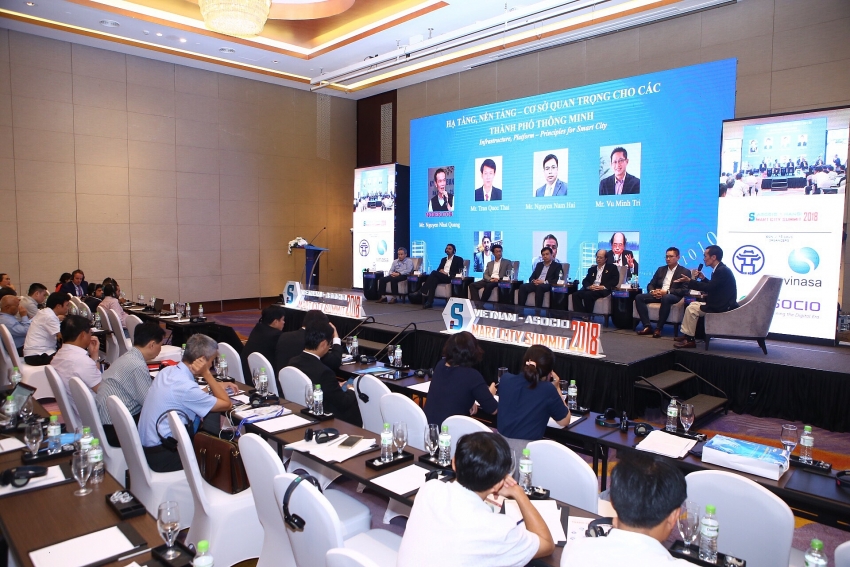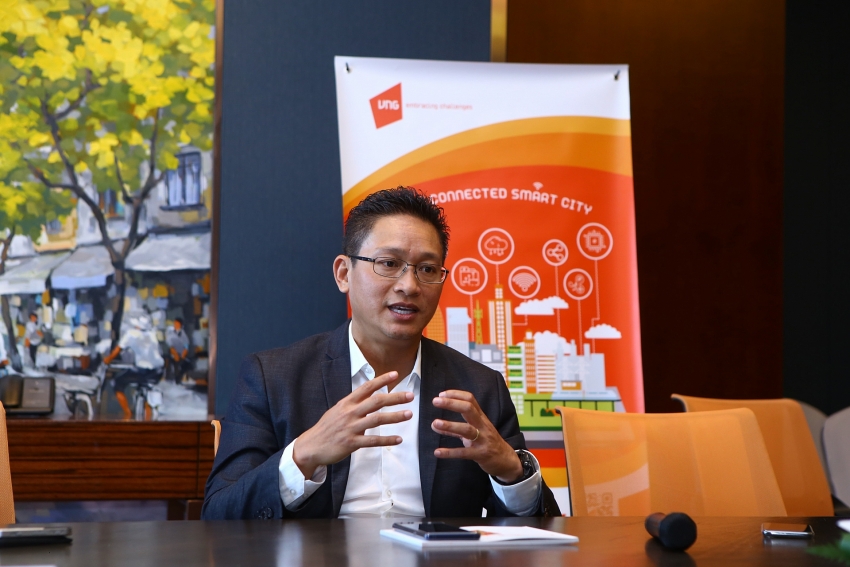Hanoi to become smarter and more secure through digital solutions
 |
| Hanoi is planning to deal with the pressures of urbanisation with smart city solutions |
The summit, held by the Hanoi People’s Committee in collaboration with the Asian-Oceanian Computing Industry Organisation (ASOCIO) and the Vietnam Software and IT Services Association (VINASA), aims to share views, strategies, and experiences in developing smart cities in Vietnam and other regional countries through the deployment of new applications using technology like the Internet of Things (IoT), Big Data, and AI.
Vietnam reports one of the highest paces of urbanisation in the region and the world. According to a report from the Ministry of Construction, Vietnam had 813 urban areas as of the end of 2017, while 37.5 per cent of the populace was living in cities.
On August 1, 2018, the prime minister approved the project on Vietnam’s smart and sustainable urban development in 2018-2025 with vision to 2030, which set the target that at least three urban areas will have their general master plan approved and start to develop infrastructure and smart city applications in 2020.
The fast growth of the population and the pace of urbanisation lead to many problems in urban planning, traffic flow, security, health, education, energy, housing development, and environmental pollution—especially in Hanoi. Many of these issues could be answered by smart city development and Industry 4 applications are expected to offer useful solutions.
Nguyen Duc Chung, Chairman of the Hanoi People’s Committee, said: “Hanoi issued a plan of developing a smart city with the priority projects of a smart operation centre, smart transport system, and smart tourism system.”
 |
| Vu Minh Tri, managing director of VinaData cum deputy CEO of VNG Corporation |
Vu Minh Tri, managing director of VinaData cum deputy CEO of VNG Corporation, emphasised the importance of connectivity in smart city development, not only between infrastructure and foundation, but also databases and applications to optimise city resources.
“A product can be smart, but it is just a piece. If it cannot be combined with other applications and infrastructure, we will not be able to create a smart city,” said Tri, adding that VNG’s technology is available to set up connectivity and improve the efficiency of a smart city.
VinaData, a subsidiary of VNG Corporation, provides cloud computing to address the complexities of urban development, such as traffic jams, the quality of power and water, as well as issues of waste, pollution, and education. These solutions contribute to developing more secure and worth-living cities by using smart cameras, focusing on health and environment, and applying smart education solutions.
Vietnam is determined to strengthen e-government and smart city development with help from over 20 cities across the country.
Identifying the potential of smart city development, VNG has changed its strategy and refocused on cloud computing and smart solutions, which will be one of the four strategic products of the corporation in the time coming, in addition to online games, social networks (Zalo, Zing), and payment and finance, which are key services for VNG to go global.
At the ASOCIO Summit, speakers also emphasised that smart city development should go along with sustainable development goals focusing on the people and the environment. Participants took the example of Sweden which develops sustainable and environmentally friendly products in clean energy and smart waste treatment.
On the side-lines of the summit, activities promoting co-operation, like the exhibition of cutting-edge technology applications for smart city development, and business-to-business meetings also took place.
What the stars mean:
★ Poor ★ ★ Promising ★★★ Good ★★★★ Very good ★★★★★ Exceptional
Related Contents
Latest News
More News
- NAB Innovation Centre underscores Vietnam’s appeal for tech investment (January 30, 2026 | 11:16)
- Vietnam moves towards market-based fuel management with E10 rollout (January 30, 2026 | 11:10)
- Vietnam startup funding enters a period of capital reset (January 30, 2026 | 11:06)
- Vietnam strengthens public debt management with World Bank and IMF (January 30, 2026 | 11:00)
- PM inspects APEC 2027 project progress in An Giang province (January 29, 2026 | 09:00)
- Vietnam among the world’s top 15 trading nations (January 28, 2026 | 17:12)
- Vietnam accelerates preparations for arbitration centre linked to new financial hub (January 28, 2026 | 17:09)
- Vietnam's IPO market on recovery trajectory (January 28, 2026 | 17:04)
- Digital economy takes centre stage in Vietnam’s new growth model (January 28, 2026 | 11:43)
- EU Council president to visit Vietnam amid partnership upgrade (January 28, 2026 | 11:00)

 Tag:
Tag:
























 Mobile Version
Mobile Version